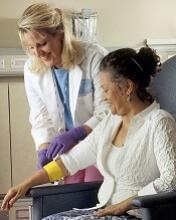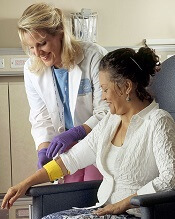User login
A new study suggests cancer patients may be open to using marijuana, but healthcare providers may be falling short in educating patients on marijuana use.
This single-center study included more than 900 cancer patients in a US state with legalized medicinal and recreational marijuana.
More than 90% of the patients surveyed said they were interested in learning more about marijuana use in the context of cancer, and nearly three-quarters of the patients wanted their cancer care providers to supply information on the topic.
However, less than 15% of patients received such information from providers. Instead, patients learned about marijuana use from sources such as the Internet or other patients.
“Cancer patients desire but are not receiving information from their cancer doctors about marijuana use during their treatment, so many of them are seeking information from alternate, non-scientific sources,” said Steven Pergam, MD, of the Fred Hutchinson Cancer Research Center in Seattle, Washington.
Dr Pergam and his colleagues reported this finding in the journal Cancer.
Eight US states and the District of Columbia have legalized recreational marijuana, and more than half of states have passed laws allowing for medical marijuana in some form. Marijuana is purported to alleviate symptoms related to cancer treatment, but patterns of use among cancer patients are not well known.
To investigate, Dr Pergam and his colleagues surveyed 926 patients at the Seattle Cancer Center Alliance. The patients’ median age was 58, 52% were male, and 59% had at least a college degree. Thirty-four percent of patients had hematologic malignancies.
Results
Sixty-six percent of patients said they had used marijuana in the past, 24% used in the last year, and 21% used in the last month.
A random analysis of patient urine samples showed that 14% of patients had evidence of recent marijuana use, similar to the 18% of users who reported at least weekly marijuana use.
When compared to patients who never used marijuana and those who previously used marijuana but quit, patients currently using marijuana said they were more likely to do so because the drug had been legalized. Women were more likely than men to use because of legalization.
Current marijuana users were younger, had less education, and were less likely to have undergone hematopoietic stem cell transplant. There was no difference in marijuana use according to a patient’s cancer type.
Most patients said they used marijuana to relieve physical symptoms (75%) and neuropsychiatric symptoms (63%), though some also used it recreationally (35%).
In addition, 26% of current marijuana users said they believed the drug was helping to treat their cancer. And 5% of these users said this was their only reason for marijuana use.
Most patients (92%) said they wanted to learn more about marijuana and cancer. However, the level of interest varied with age, with younger patients expressing the most interest.
Seventy-four percent of patients said they would prefer to get information on marijuana use from their cancer team, but less than 15% received such information from their cancer physician or nurse.
Patients said they received information on marijuana and cancer from friends and family, newspaper and magazine articles, websites and blogs, or another cancer patient.
More than a third of patients said they had not received any information on marijuana and cancer.
“We hope that this study helps to open up the door for more studies aimed at evaluating the risks and benefits of marijuana in this population,” Dr Pergam said. “This is important because if we do not educate our patients about marijuana, they will continue to get their information elsewhere.” ![]()
A new study suggests cancer patients may be open to using marijuana, but healthcare providers may be falling short in educating patients on marijuana use.
This single-center study included more than 900 cancer patients in a US state with legalized medicinal and recreational marijuana.
More than 90% of the patients surveyed said they were interested in learning more about marijuana use in the context of cancer, and nearly three-quarters of the patients wanted their cancer care providers to supply information on the topic.
However, less than 15% of patients received such information from providers. Instead, patients learned about marijuana use from sources such as the Internet or other patients.
“Cancer patients desire but are not receiving information from their cancer doctors about marijuana use during their treatment, so many of them are seeking information from alternate, non-scientific sources,” said Steven Pergam, MD, of the Fred Hutchinson Cancer Research Center in Seattle, Washington.
Dr Pergam and his colleagues reported this finding in the journal Cancer.
Eight US states and the District of Columbia have legalized recreational marijuana, and more than half of states have passed laws allowing for medical marijuana in some form. Marijuana is purported to alleviate symptoms related to cancer treatment, but patterns of use among cancer patients are not well known.
To investigate, Dr Pergam and his colleagues surveyed 926 patients at the Seattle Cancer Center Alliance. The patients’ median age was 58, 52% were male, and 59% had at least a college degree. Thirty-four percent of patients had hematologic malignancies.
Results
Sixty-six percent of patients said they had used marijuana in the past, 24% used in the last year, and 21% used in the last month.
A random analysis of patient urine samples showed that 14% of patients had evidence of recent marijuana use, similar to the 18% of users who reported at least weekly marijuana use.
When compared to patients who never used marijuana and those who previously used marijuana but quit, patients currently using marijuana said they were more likely to do so because the drug had been legalized. Women were more likely than men to use because of legalization.
Current marijuana users were younger, had less education, and were less likely to have undergone hematopoietic stem cell transplant. There was no difference in marijuana use according to a patient’s cancer type.
Most patients said they used marijuana to relieve physical symptoms (75%) and neuropsychiatric symptoms (63%), though some also used it recreationally (35%).
In addition, 26% of current marijuana users said they believed the drug was helping to treat their cancer. And 5% of these users said this was their only reason for marijuana use.
Most patients (92%) said they wanted to learn more about marijuana and cancer. However, the level of interest varied with age, with younger patients expressing the most interest.
Seventy-four percent of patients said they would prefer to get information on marijuana use from their cancer team, but less than 15% received such information from their cancer physician or nurse.
Patients said they received information on marijuana and cancer from friends and family, newspaper and magazine articles, websites and blogs, or another cancer patient.
More than a third of patients said they had not received any information on marijuana and cancer.
“We hope that this study helps to open up the door for more studies aimed at evaluating the risks and benefits of marijuana in this population,” Dr Pergam said. “This is important because if we do not educate our patients about marijuana, they will continue to get their information elsewhere.” ![]()
A new study suggests cancer patients may be open to using marijuana, but healthcare providers may be falling short in educating patients on marijuana use.
This single-center study included more than 900 cancer patients in a US state with legalized medicinal and recreational marijuana.
More than 90% of the patients surveyed said they were interested in learning more about marijuana use in the context of cancer, and nearly three-quarters of the patients wanted their cancer care providers to supply information on the topic.
However, less than 15% of patients received such information from providers. Instead, patients learned about marijuana use from sources such as the Internet or other patients.
“Cancer patients desire but are not receiving information from their cancer doctors about marijuana use during their treatment, so many of them are seeking information from alternate, non-scientific sources,” said Steven Pergam, MD, of the Fred Hutchinson Cancer Research Center in Seattle, Washington.
Dr Pergam and his colleagues reported this finding in the journal Cancer.
Eight US states and the District of Columbia have legalized recreational marijuana, and more than half of states have passed laws allowing for medical marijuana in some form. Marijuana is purported to alleviate symptoms related to cancer treatment, but patterns of use among cancer patients are not well known.
To investigate, Dr Pergam and his colleagues surveyed 926 patients at the Seattle Cancer Center Alliance. The patients’ median age was 58, 52% were male, and 59% had at least a college degree. Thirty-four percent of patients had hematologic malignancies.
Results
Sixty-six percent of patients said they had used marijuana in the past, 24% used in the last year, and 21% used in the last month.
A random analysis of patient urine samples showed that 14% of patients had evidence of recent marijuana use, similar to the 18% of users who reported at least weekly marijuana use.
When compared to patients who never used marijuana and those who previously used marijuana but quit, patients currently using marijuana said they were more likely to do so because the drug had been legalized. Women were more likely than men to use because of legalization.
Current marijuana users were younger, had less education, and were less likely to have undergone hematopoietic stem cell transplant. There was no difference in marijuana use according to a patient’s cancer type.
Most patients said they used marijuana to relieve physical symptoms (75%) and neuropsychiatric symptoms (63%), though some also used it recreationally (35%).
In addition, 26% of current marijuana users said they believed the drug was helping to treat their cancer. And 5% of these users said this was their only reason for marijuana use.
Most patients (92%) said they wanted to learn more about marijuana and cancer. However, the level of interest varied with age, with younger patients expressing the most interest.
Seventy-four percent of patients said they would prefer to get information on marijuana use from their cancer team, but less than 15% received such information from their cancer physician or nurse.
Patients said they received information on marijuana and cancer from friends and family, newspaper and magazine articles, websites and blogs, or another cancer patient.
More than a third of patients said they had not received any information on marijuana and cancer.
“We hope that this study helps to open up the door for more studies aimed at evaluating the risks and benefits of marijuana in this population,” Dr Pergam said. “This is important because if we do not educate our patients about marijuana, they will continue to get their information elsewhere.” ![]()

